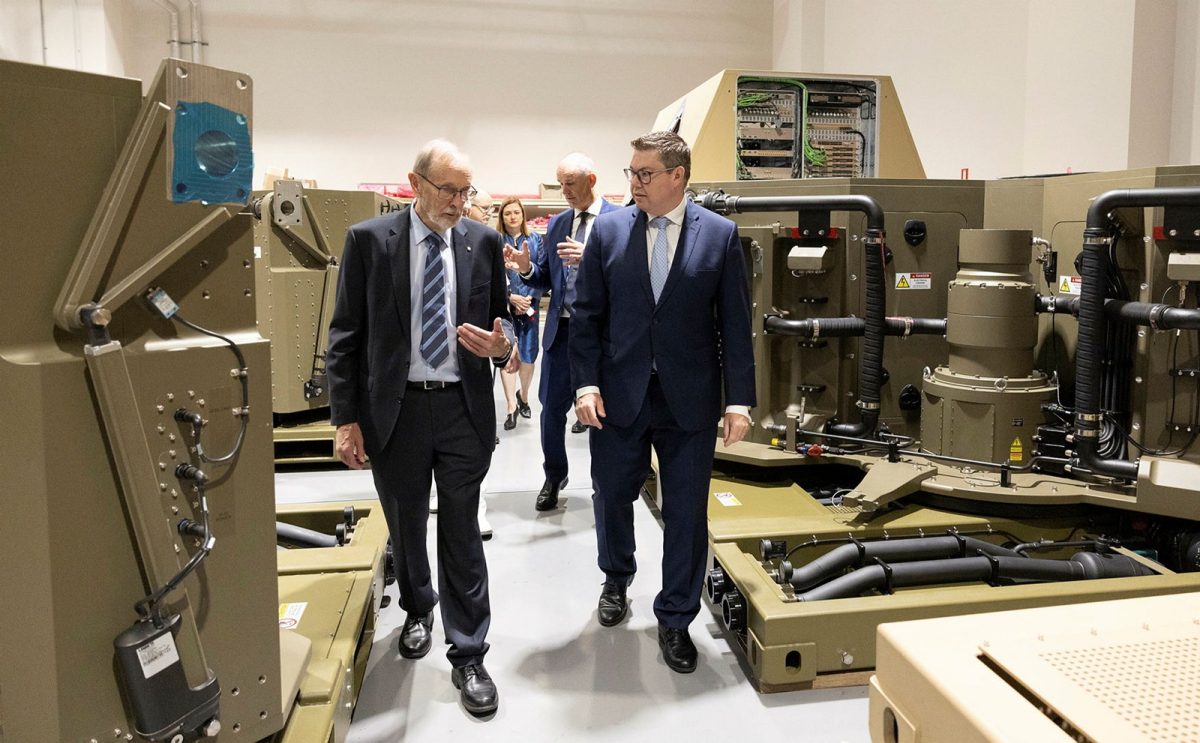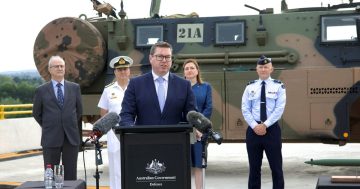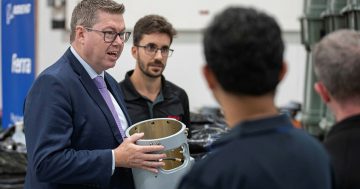
CEA Technologies co-founder Ian Croser (left) and Defence Industry Minister Pat Conroy tour CEA’s facilities in Canberra. Photo: ADF.
Australia’s growing defence industry will have greater opportunities to deliver on the needs of major Defence projects under the Federal Government’s new Defence Industry Development Strategy (DIDS), according to a leading industry procurement and supply chain body.
The Industry Capability Network (ICN) said it welcomed the release of the strategy, which aims to define the strategic rationale for a sovereign defence industrial base, and sets out pathways for maximising support for Australian industry and its critical contribution to national security.
The DIDS lays out what defence industrial base capabilities will be needed in the face of the changing strategic circumstances outlined in the 2023 Defence Strategic Review (DSR), and details the actions the government will take to grow that industrial base and deliver a greater partnership between Defence and industry.
It also seeks to simplify the defence industry grants process while taking the investment to $183 million, and streamline Defence’s procurement framework without compromising on governance. It has consolidated and reduced the previous number of Sovereign Defence Industrial Priorities (SDIP) to seven.
The DIDS also highlights the need to pursue closer industrial collaboration and integration with trusted partners, including co-development, co-production and co-sustainment opportunities, as well as improve the measurement of industrial capability and capacity.
“Defence is working on analysing and mapping our sovereign defence industrial base and its many supply chains,” the DIDS document says. “This includes our collaboration with trusted international partners, including assessments of capability, capacity and resilience to meet Defence’s requirements.
“Defence will draw on a range of information sources to build this data, including the Industry Capability Network (ICN).”
Importantly for Australian businesses, Defence will mandate the use of existing businesses supporting the SDIPs as part of a larger tender.
The DIDS says this could take the form of mandating the use of a single company, or several identified companies that demonstrate capability and capacity to satisfy SDIPs.
An example of this already in action is the use of Canberra-based CEA Technologies and its world-leading radar capabilities. However, the DIDS envisages this will be expanded as part of its implementation where it is necessary to support and grow the SDIPs.
Further into the document, the DIDS also highlights Defence’s aims to build its industry and market intelligence to provide greater insight into the capability and capacity of the defence industry.
It says this is critical for the early stages of developing capability initiatives and informing industry engagement, solicitation and tender evaluation strategies. Access to analytical tools, market research and industry engagement is key to delivering capability at speed.
“The Industry Capability Network platform is a key example of an industry data source that is capable of supporting this approach,” it says. “This capability will assist in building a resilient industrial base, by providing the information needed to assess the capacity, size, and scale to meet Australian defence needs.”
ICN is supported by the Federal Department of Industry to ensure that suppliers have full, fair and reasonable opportunity to access public and private projects. So far, ICN says its work has helped facilitate supplier contracts valued at more than $53 billion, and created thousands of jobs and significantly expanded local industry participation.
“ICN works across multiple sectors and with the Australian Government in relation to the Buy Australia Plan and the National Reconstruction Fund, as well as Defence, to support local industry,” ICN National Office CEO Warren Jansen said in a 29 February statement.
“Our aim is to ensure that supply chains are resilient and sustainable so that we can grow and build sovereign capability aligned to the Defence Industry Development Strategy announced by Minister Pat Conroy yesterday.”
Original Article published by Andrew McLaughlin on Riotact.











